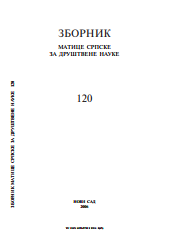ДРУШТВЕНИ КОРЕНИ КРИМИНАЛИТЕТА У СРБИЈИ
SOCIAL ROOTS OF CRIMINALITY IN SERBIA
Author(s): Milovan M. MitrovićSubject(s): Sociology, Evaluation research, Criminology
Published by: Матица српска
Keywords: social conflicts; crime; corruption; organized crime;
Summary/Abstract: This paper consists of two parts. The first part, in a theoretical-hypothetical manner, discusses social organization, conflicts and criminality, while the second discusses some specific problems related to corruption and organized crime in Serbia. The first part expounds the hypothesis that the social conflicts (war, external sanctions and the breakdown of the regime) led to a deep crisis and destruction (disorganization) of the Serbian society, which directly caused the sharp increase in all kinds of criminality in Serbia. Starting from the assumption that criminality has the characteristics of a total social phenomenon as well as many faces and seamy sides, the author distinguishes three sociologically most significant social roots and forms of criminality in Serbia, that is the systemic, anomic and transitional ones. The second part specially discusses corruption as a form of systematic and transitional criminality and as the backbone of organized crime in Serbia. The author believes that the deepest causes of corruption have their roots in the old socialist system and recent transitional regimes in which the public property (state and social property) was managed by the powerful individuals and privileged groups, usually according to their own will. In that sense, the author concludes that corruption and organized crime are, on the one hand, the consequences of war and disintegration of the socialist system and the heritage of the former regime, and on the other the consequences of interest blockades in the construction of new and more efficient institutions of social control and regular mechanisms of modern development, so in that sense they are a newly-created transitional phenomenon of the unfinished democratic system. Therefore, the paper points out that the reformed and strengthened public institutions are the only serious and efficient obstacle to corruption and all other forms of organized criminality. In the first place, reforms should imply the withdrawal of the state from the direct administrative management of economic activities, leaving them to a legally ordered market. Strengthening of public institutions would imply more efficient minimal state functions; all other institutions should get, on the one hand, real means and mechanisms to implement their duties, and on the other they themselves should be under public control in their work which has to be more „transparent" than it is today.
Journal: Зборник Матице српске за друштвене науке
- Issue Year: 2006
- Issue No: 120
- Page Range: 113-128
- Page Count: 16
- Language: Serbian

